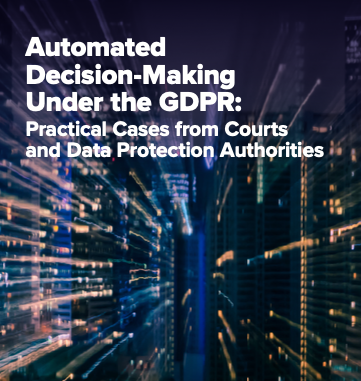
FPF-AnnualReport2021-FINAL2-Digital
ANNUAL REPORT 2021 B FUTURE OF PRIVACY FORUM ANNUAL REPORT 2021 1 Contents About FPF ____________________________________2 Leadership Letter _______________________________ 4 Expanding Globally _____________________________ 5 Bringing Diverse Stakeholders Together _____________7 Educating Key Privacy Stakeholders Across Sectors _____8 Protecting Data Privacy of Youth at Home and School ___ 14 Board of Directors _____________________________ 16 Advisory Board _______________________________ […]

FPF Report: Automated Decision-Making Under the GDPR – A Comprehensive Case-Law Analysis
On May 17, the Future of Privacy Forum launched a comprehensive Report analyzing case-law under the General Data Protection Regulation (GDPR) applied to real-life cases involving Automated Decision Making (ADM). The Report is informed by extensive research covering more than 70 Court judgments, decisions from Data Protection Authorities (DPAs), specific Guidance and other policy documents […]

FPF ADM Report R2 singles
Automated Decision-Making Under the GDPR: Practical Cases from Courts and Data Protection Authorities The Future of Privacy Forum (FPF) is a non-profit organization that serves as a catalyst for privacy leadership and scholarship, advancing principled data practices in support of emerging technologies. Learn more about FPF by visiting fpf.org . FPF Europe maintains strong partnerships […]

BCI Technical and Policy Recommendations to Mitigate Privacy Risks
This is the final post of a four-part series on Brain-Computer Interfaces (BCIs), providing an overview of the technology, use cases, privacy risks, and proposed recommendations for promoting privacy and mitigating risks associated with BCIs. Click here for FPF and IBM’s full report: Privacy and the Connected Mind. In case you missed them, read the […]

BCI Commercial and Government Use: Gaming, Education, Employment, and More
This post is the third in a four-part series on Brain-Computer Interfaces (BCIs), providing an overview of the technology, use cases, privacy risks, and proposed recommendations for promoting privacy and mitigating risks associated with BCIs. Click here for FPF and IBM’s full report: Privacy and the Connected Mind. In case you missed them, read the […]

BCIs & Data Protection in Healthcare: Data Flows, Risks, and Regulations
This post is the second in a four-part series on Brain-Computer Interfaces (BCIs), providing an overview of the technology, use cases, privacy risks, and proposed recommendations for promoting privacy and mitigating risks associated with BCIs. Click here for FPF and IBM’s full report: Privacy and the Connected Mind. In case you missed it, read the […]

Understanding why the first pieces fell in the transatlantic transfers domino
Two decisions issued by Data Protection Authorities (DPAs) in Europe and published in the second week of January 2022 found that two websites, one run by a contractor of the European Parliament (EP), and the other one by an Austrian company, have unlawfully transferred personal data to the US merely by placing cookies (Google Analytics and Stripe) provided by two US-based companies on the devices of their visitors.

Brain-Computer Interfaces & Data Protection: Understanding the Technology and Data Flows
This post is the first in a four-part series on Brain-Computer Interfaces (BCIs), providing an overview of the technology, use cases, privacy risks, and proposed recommendations for promoting privacy and mitigating risks associated with BCIs. Click here for FPF and IBM’s full report: Privacy and the Connected Mind. Additionally, FPF-curated resources, including policy & regulatory […]

Overcoming Hurdles to Effective Data Sharing for Researchers
In 2021, challenges faced by academics in accessing corporate data sets for research and the issues that companies were experiencing to make privacy-respecting research data available broke into the news. With its long history of research data sharing, FPF saw an opportunity to bring together leaders from the corporate, research, and policy communities for a conversation […]

FPF Education and Innovation Foundation Final 2019 Audited Financials
FINANCIAL STATEMENTS DECEMBER 31, 2019 FPF EDUCATION AND INNOVATION FOUNDATION TABLE OF CONTENTS DECEMBER 31, 2019 Pages Independent Auditors’ Report ………………………….. ………………………….. ………………………….. . 3-4 Financial Statements Statement of Financial Position ………………………….. ………………………….. ………………………. 5 Statement of Activities ………………………….. ………………………….. ………………………….. ……… 6 Statement of Functional Expenses ………………………….. ………………………….. …………………… 7 Statement of Cash Flows […]
